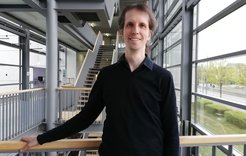New Research Group Data-driven Modeling of Complex Physical Systems at the Max Planck Institute Magdeburg
Data-based Methods for Modeling, Analysis and Control of Complex Dynamical Systems
Dr. Feliks Nüske is the head of the newly established research group Data-driven Modeling of Complex Physical Systems (DMP) at the Max Planck Institute for Dynamics of Complex Technical Systems in Magdeburg. The group is part of the Division of Computational Methods in Systems and Control Theory (Prof. Peter Benner). Their aim is to mathematically describe complex real-world processes ranging across the natural and engineering sciences.
Computer simulations of complex dynamical systems are ubiquitous in the natural and engineering sciences. However, efficiently generating sufficient simulation data in order to make reliable predictions for real-world applications - such as molecular systems at atomistic or quantum resolution - remains an open problem. In this context, leveraging the capabilities of modern machine learning techniques has attracted significant attention in recent years.
The new research group Data-driven Modeling of Complex Physical Systems (DMP), headed by the mathematician Dr. Feliks Nüske, is focused on the development of robust data-based methods for modeling, analysis, and control of complex dynamical systems. They seek to combine tools from a broad variety of fields, including machine learning, numerical linear algebra, and control theory. Practical application to physical systems on the atomistic or molecular scale is also part of their research agenda.
The DMP group seeks to develop innovative algorithmic tools to accompany the model building process all along the way. Their main theoretical tool at this time is Koopman theory, which provides a linear statistical description of a nonlinear dynamical system on an infinite-dimensional function space. The main goal in this context is to develop efficient and statistically robust estimation methods equipped with a mathematical error theory. To this end, they draw on elements of statistical learning and optimization, numerical linear algebra, stochastic analysis, and control theory.
About Dr. rer. nat. Feliks Nüske

Feliks Nüske, 35, received his Masters degree in Mathematics in 2012 at the Freie Universität Berlin (Germany). From 2012 bis 2017 he obtained his Ph.D. at Freie Universität Berlin (Germany), Department of Mathematics and Computer Science (Prof. Frank Noé). Afterwards he conducted scientific work as a Postdoctoral Fellow at the Center for Theoretical Biological Physics and at the Department of Chemistry at Rice University in Houston, Texas, USA. From 2019 to 2022 he was a Postdoctoral Researcher at the Institute of Mathematics at Universität Paderborn (Germany).
